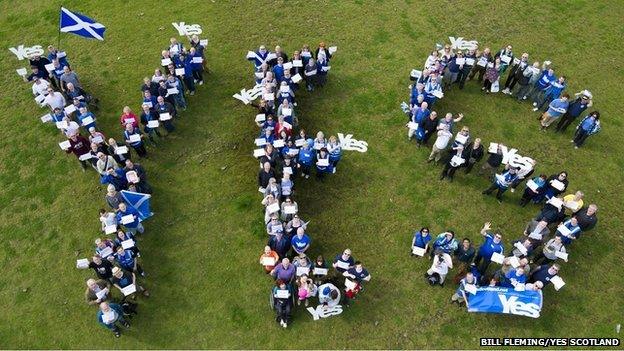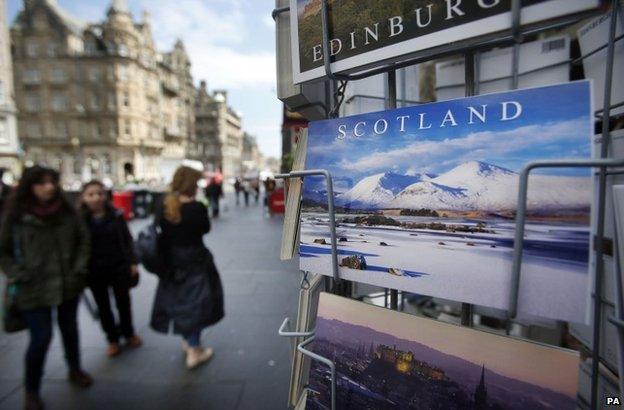Scottish independence: Referendum campaigns mark 100 day milestone
- Published
- comments
First Minister Alex Salmond and Better Together leader Alistair Darling each made their case to voters in Scotland
Campaigners in the Scottish independence debate have marked 100 days until the referendum.
First Minister Alex Salmond said there was enough time for the "Yes" campaign to close the gap on opponents, ahead of the 18 September vote.
Alistair Darling, of the pro-Union Better Together campaign, said he was confident of a deal on new Scottish Parliament powers after a "No" vote.
Opinion polls suggest the campaign for the Union is ahead in the race.
However, the official campaign for independence, Yes Scotland, claimed undecided voters were backing its case at a rate of two-to-one compared with those who shifted to a pro-Union position.
Mr Salmond told BBC Scotland's Glenn Campbell he believed 100 days was plenty of time for the gap to be overturned.
"If you average all the polls then I think we need a 6% swing," said the first minister, adding: "In the months before the last Scottish elections we got a 16% swing in this sort of timescale.
"Yes we have got enough time - it is not the time that is the issue. It is winning the arguments, winning the discussion."
Mr Salmond said: "The key argument to winning is not just Scotland being more prosperous, but a better and a more equal society using the natural resources and human resources of the country. If we win that argument, we win the referendum."
The first minister went on to say politicians on the "Yes" side were "substantially more popular" than their opponents, which he suggested gave them an advantage in terms of credibility.

Yes Scotland campaigners spelled out a giant human "Yes" sign in Edinburgh to mark the milestone

Alistair Darling launched Better Together's 100 Days to Go campaign at an event in Glasgow
He said: "If the 'Yes' campaign set out the case for Scotland being a more prosperous but also a more equal society, is that going to be credible with the Scottish population? I think the answer to that is 'Yes'.
"If the No campaign keep saying that the seven plagues of Egypt are going to descend on the country once we vote for independence, are they going to be believed? I think the answer to that is 'No'."
Cabinet event
Scotland's deputy first minister, Nicola Sturgeon, marked the 100-day milestone by hosting the Scottish government's first all-women cabinet event, in Edinburgh.
It offered more than 100 women the opportunity to ask female ministers about issues such as female representation on boards and childcare improvement.
The Scottish government is proposing mandatory quotas that ensure a minimum of 40% of women's representation on public boards.
Ms Sturgeon said she believed the objective should be to get female representation to 52%, which would equal the female percentage of the population in Scotland.
Next election
She added: "I want to see the process of drawing up a written constitution for an independent Scotland be as open and collaborative as possible - and that does mean women have to be equally represented around that table when it comes to that."
Meanwhile, Mr Darling launched Better Together's 100 Days to Go campaign in Glasgow, saying a strengthened Scottish Parliament within the UK offered "the best of both worlds".
He told the BBC the main pro-Union parties had now promised "substantial expansion" to Holyrood's powers which would be contained in their manifestoes for the 2015 UK election.
"If people vote 'No' it will be a vote for change - it's not the status quo," said the former UK chancellor.
"All three parties have come up with proposals - and they're not that very different actually - and I hope, in the next period, they will come together, so we'll have a proposal that can be put to people.

Scotland's independence referendum is being held on 18 September
"People will know that all three party leaders have said there will be a commitment to legislate after the next general election, so there's a clear choice - a choice for change within the United Kingdom or simply breaking away and leaving the UK."
Asked if there should be a cross-party offer on more Holyrood powers before the referendum, Mr Darling responded: "I think the first thing you've got to decide is whether we're staying in the UK, or whether we're leaving.
"If we get a a 'No' vote, if we're staying in the UK, then I would like to see the three parties come together so we can have a proposal ready for legislation, probably immediately after the next general election, which is less than a year away now."
Elsewhere, in a speech in London, Gordon Brown said Prime Minister David Cameron should debate the independence issue with Mr Salmond, ahead of the referendum.
The former PM dismissed arguments Mr Cameron should stand back from the battle because he was toxic to Scottish voters.
"The prime minister has got to be part of this debate," Mr Brown told journalists at a Westminster lunch.
He added: "I think it would be a good idea if David Cameron did debate Alex Salmond, but I'm not involved in the negotiations."